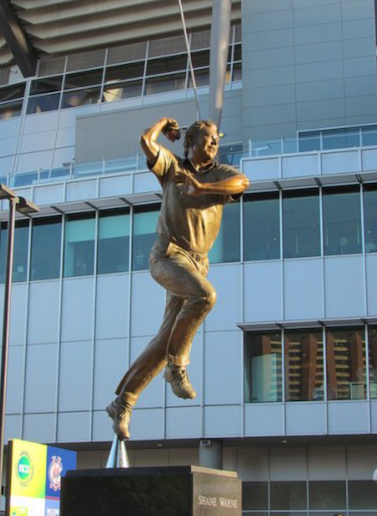Shane Warne didn’t quite do well against India, neither when he began his journey nor by when he was approaching his end. But never, in those six series between 1992-2004, did he fail to excite media or fans. We all awaited when the prey would run out of his legs.
There was Australia where the pitches had bounce and India where it had turn; one with the rough outside the leg-stump and the other of widening cracks swallowed up batsmen in second innings. They were Warne’s meal, foretold.
Nothing of the sort happened with India. We had our Tendulkar with his own star cast of Dravids and Laxmans. They spun their own legends at Chepauk, Eden Gardens or Sharjah. But we, the insiders, knew most of these were near-things.
At Chepauk, India had trailed Australia when Tendulkar realized only one of the two could come out of the ring, head aloft. Warne had him in the first, all those endless hours of simulated preparation amounting to little; so in the second he chose to pull than pad those spitting from outside his leg; the regulars and flippers to be met as he deemed fit.
Warne was to go for over four runs on an average in his 30 overs. But very few remember Warne didn’t keep a deep midwicket even as Tendulkar pulled and pulled. Warne gambled, that very core of a spinner, for on one false stroke rested not just the fate of that 1998 series but also if Tendulkar would be lesser in the quest of the two to dominate world cricket in years to come.
Very few appreciate how much Warne ruled by the dint of his mind games. He would walk with a dismissed Andrew Hudson towards the pavilion and say unprintables; a Daryll Cullinan had to seek a psychologist; and Warne could do all that because he ran a X-ray on a batsman’s mind. There is this very famous anecdote on how he could predict Carl Hooper would go for a six next ball—because the West Indian always used to come out and tap the pitch before he did it next ball.
I would come to Eden Gardens and Sharjah but this is the moment when Pakistan’s umpire Asad Rauf must make an appearance. Rauf did any number of Tests for seven long years. Most in the game would grant he was a damn good umpire. But every morning of a Test against Australia was a different proposition. For he had to judge on what Warne did at his end.
“Our reputations were made or broken on how we did on the scale of Warne. He tested out early if we could spot his degree of spin—did it spin too much, too little, was it a flipper or a sidespin? There would be appeals galore. His histrionics sooner or later made us do what he wanted.” That is, occasional wrong decisions, which lowered your marks in ICC’s evaluation and pretty much ruled if you stayed in elite umpires’ panel. Warne simply put an umpire’s career on the line. (This of course was the pre-DRS years).
I remember once in Adelaide in 1999, after India had lost by 285 runs, I asked Warne, after we two had gotten out of loo, if he felt bad on getting Tendulkar out wrongly in the Test. The Indian genius had been “caught” at forward short leg off his bowling when it had missed his bat altogether. “Man, wasn’t he out?” Warne was surprised. You couldn’t tell if he was faking as the umpire Daryl Harper might have been sucked too in upholding his appeal against Tendulkar.
To catch up on our Indian thread, yes India did once-in-a- generation game against Australia at Kolkata in 2001. We had trailed by nearly 300 runs on the first innings when Dravid and Laxman did the unthinkable after the follow-on. But very few know that Warne was against imposing the follow-on. He had felt the heat and humility at Eden Gardens had taken the toll on bowlers. But captain Steve Waugh, he was to say later, had a rare series win in India in sight: Waugh’s impatience got the better of his judgment.
Then there was Sharjah, those back-to-back hundreds from our little champion. Tendulkar was unstoppable, against Warne, in a swirling dust-storm, under lights, against all hopes and it’s a classic for ages. But it still was a one-day game, and Warne had his 10 overs, and the purists judge on more than a midnight match.
Yet Warne is special to Indians, mesmerized like anyone else on his magic in the Ashes–nearly 200 wickets in merely 36 Tests–that primal joy he conjured up in stripping batsmen of their honour; the acerbic tongue he reserved for prima donnas like John Buchanan (coach) and Waugh (captain); the controversy of drugs, match-fixing, sex-scandals only a help since sport is better when there’s a villain. If he appeared the wild dog, and Australians that perennial Ugly, he couldn’t care less. His team was one of the best-ever which ever took the field and he himself a colossus in a life worth 20 million other lives on the scales of impact.
He was brash but made the audience care about his fights. They couldn’t take eyes off if he was a hero to cheer for or a villain to root against. He whipped up an assortment of expressions; his despair, joy, insistence all reminded of a kid who wouldn’t come out empty handed from a candy store. He was that boy, that ample frame, you expect to carry a snicker bar in his kit.
Yet his antics didn’t undermine his skill or mind. He drifted into his bowling crease and cast a hypnosis on the batsmen like few in history have. He believed that the code of spin bowling is to make a batsman think something special is happening when it isn’t.
He was a phenomenon who stirred the masses and moved the poets—what else we could say.



